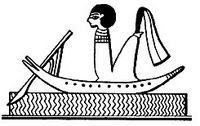What leads to eudaimonia (human flourishing)?
Philosophy Now shares Philip Cafaro's "The Virtues of Self-Help" from its March-April 2004 issue. The article examines five self-help bestsellers for "virtue ethics," including Thomas Moore's Care of the Soul. The other selections are Wayne Dyer, Your Erroneous Zones (1976); Robert Ringer, Looking Out for #1 (1977); Leo Buscaglia, Love (1972); M. Scott Peck, The Road Less Travelled (1978).
Cafaro suggests, "[A] benefit of looking at the self-help literature is that it focuses our attention on popular, current conceptions of human excellence and flourishing. Early in the virtue ethics revival, many proponents called for an increased empiricism in ethics, but more recently this goal seems to have been forgotten. In his Nicomachean Ethics, Aristotle considers popular conceptions of eudaimonia, or human flourishing, partly because such popular beliefs are likely to contain some truth and because they are necessarily in competition with any doctrines that philosophers may propound."
Cafaro states, "Of the five authors surveyed here, only one, Thomas Moore, consistently uses the word ‘virtue’ to denote those character traits or personal qualities he praises. ‘Virtue’ is my word for such qualities. Interestingly, these authors get by without any single general term for the traits they are praising, but those of us who want to analyze and compare their views need such a term and ‘virtue’ is the natural and traditional choice."
He includes a chart sharing each author's list of desirable virtues with selected quotes from their books. For Care of the Soul, Cafaro shows: "Imagination, attentiveness, intelligence, self-knowledge, ‘capacity to be affected’, devotion, intensity (passion), creativity, forcefulness, individuality, courage, strength, depth, insight, self-acceptance, wisdom, reverence."
His quotes from Moore's Introduction are:
Cafaro suggests, "[A] benefit of looking at the self-help literature is that it focuses our attention on popular, current conceptions of human excellence and flourishing. Early in the virtue ethics revival, many proponents called for an increased empiricism in ethics, but more recently this goal seems to have been forgotten. In his Nicomachean Ethics, Aristotle considers popular conceptions of eudaimonia, or human flourishing, partly because such popular beliefs are likely to contain some truth and because they are necessarily in competition with any doctrines that philosophers may propound."
Cafaro states, "Of the five authors surveyed here, only one, Thomas Moore, consistently uses the word ‘virtue’ to denote those character traits or personal qualities he praises. ‘Virtue’ is my word for such qualities. Interestingly, these authors get by without any single general term for the traits they are praising, but those of us who want to analyze and compare their views need such a term and ‘virtue’ is the natural and traditional choice."
He includes a chart sharing each author's list of desirable virtues with selected quotes from their books. For Care of the Soul, Cafaro shows: "Imagination, attentiveness, intelligence, self-knowledge, ‘capacity to be affected’, devotion, intensity (passion), creativity, forcefulness, individuality, courage, strength, depth, insight, self-acceptance, wisdom, reverence."
His quotes from Moore's Introduction are:
“We know intuitively that soul has to do with genuineness and depth … it is tied to life in all its particulars – good food, satisfying conversation, genuine friends, and experiences that stay in the memory and touch the heart. Soul is revealed in attachment, love, and community, as well as in retreat on behalf of inner communing and intimacy.” (pp.xi-xii)
“Fulfilling work, rewarding relationships, personal power, and relief from symptoms are all gifts of the soul.” (p.xiii)
“The goal is a richly elaborated life, connected to society and nature, woven into the culture of family, nation, and globe.” (p.xviii)






